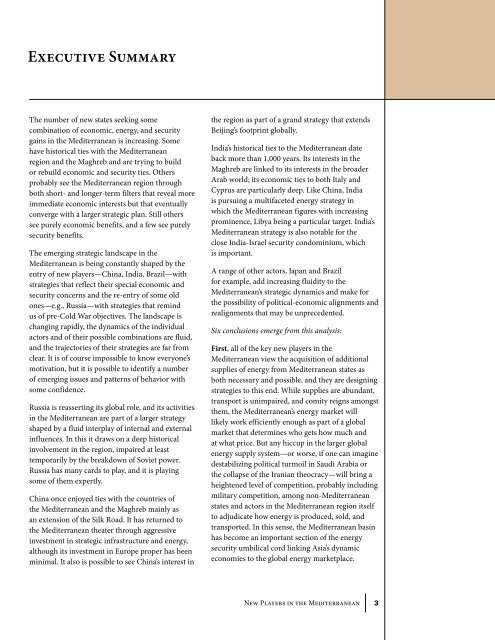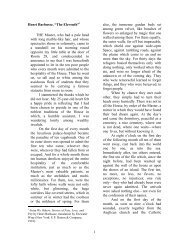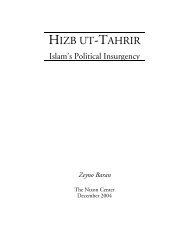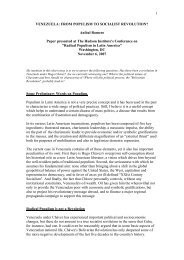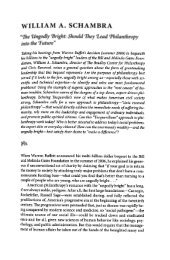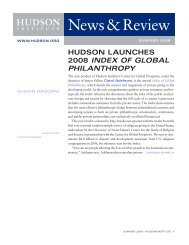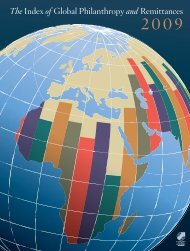NEW PLAYERS IN THE MEDITERRANEAN - German Marshall ...
NEW PLAYERS IN THE MEDITERRANEAN - German Marshall ...
NEW PLAYERS IN THE MEDITERRANEAN - German Marshall ...
Create successful ePaper yourself
Turn your PDF publications into a flip-book with our unique Google optimized e-Paper software.
Executive Summary<br />
The number of new states seeking some<br />
combination of economic, energy, and security<br />
gains in the Mediterranean is increasing. Some<br />
have historical ties with the Mediterranean<br />
region and the Maghreb and are trying to build<br />
or rebuild economic and security ties. Others<br />
probably see the Mediterranean region through<br />
both short- and longer-term filters that reveal more<br />
immediate economic interests but that eventually<br />
converge with a larger strategic plan. Still others<br />
see purely economic benefits, and a few see purely<br />
security benefits.<br />
The emerging strategic landscape in the<br />
Mediterranean is being constantly shaped by the<br />
entry of new players—China, India, Brazil—with<br />
strategies that reflect their special economic and<br />
security concerns and the re-entry of some old<br />
ones—e.g., Russia—with strategies that remind<br />
us of pre-Cold War objectives. The landscape is<br />
changing rapidly, the dynamics of the individual<br />
actors and of their possible combinations are fluid,<br />
and the trajectories of their strategies are far from<br />
clear. It is of course impossible to know everyone’s<br />
motivation, but it is possible to identify a number<br />
of emerging issues and patterns of behavior with<br />
some confidence.<br />
Russia is reasserting its global role, and its activities<br />
in the Mediterranean are part of a larger strategy<br />
shaped by a fluid interplay of internal and external<br />
influences. In this it draws on a deep historical<br />
involvement in the region, impaired at least<br />
temporarily by the breakdown of Soviet power.<br />
Russia has many cards to play, and it is playing<br />
some of them expertly.<br />
China once enjoyed ties with the countries of<br />
the Mediterranean and the Maghreb mainly as<br />
an extension of the Silk Road. It has returned to<br />
the Mediterranean theater through aggressive<br />
investment in strategic infrastructure and energy,<br />
although its investment in Europe proper has been<br />
minimal. It also is possible to see China’s interest in<br />
the region as part of a grand strategy that extends<br />
Beijing’s footprint globally.<br />
India’s historical ties to the Mediterranean date<br />
back more than 1,000 years. Its interests in the<br />
Maghreb are linked to its interests in the broader<br />
Arab world; its economic ties to both Italy and<br />
Cyprus are particularly deep. Like China, India<br />
is pursuing a multifaceted energy strategy in<br />
which the Mediterranean figures with increasing<br />
prominence, Libya being a particular target. India’s<br />
Mediterranean strategy is also notable for the<br />
close India-Israel security condominium, which<br />
is important.<br />
A range of other actors, Japan and Brazil<br />
for example, add increasing fluidity to the<br />
Mediterranean’s strategic dynamics and make for<br />
the possibility of political-economic alignments and<br />
realignments that may be unprecedented.<br />
Six conclusions emerge from this analysis:<br />
First, all of the key new players in the<br />
Mediterranean view the acquisition of additional<br />
supplies of energy from Mediterranean states as<br />
both necessary and possible, and they are designing<br />
strategies to this end. While supplies are abundant,<br />
transport is unimpaired, and comity reigns amongst<br />
them, the Mediterranean’s energy market will<br />
likely work efficiently enough as part of a global<br />
market that determines who gets how much and<br />
at what price. But any hiccup in the larger global<br />
energy supply system—or worse, if one can imagine<br />
destabilizing political turmoil in Saudi Arabia or<br />
the collapse of the Iranian theocracy—will bring a<br />
heightened level of competition, probably including<br />
military competition, among non-Mediterranean<br />
states and actors in the Mediterranean region itself<br />
to adjudicate how energy is produced, sold, and<br />
transported. In this sense, the Mediterranean basin<br />
has become an important section of the energy<br />
security umbilical cord linking Asia’s dynamic<br />
economies to the global energy marketplace.<br />
New Players in the Mediterranean 3


